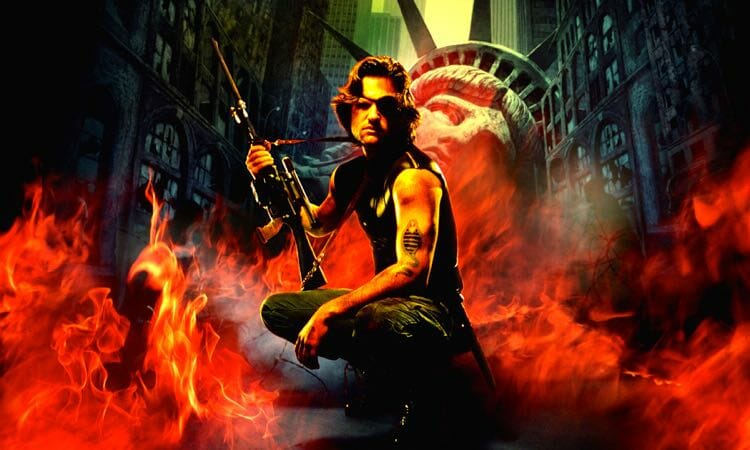By Rudy Devine · November 3, 2014

Action movies with high stakes and powerful villains blend easily with other genres including comedy, thriller, and sci-fi, with the plots often mattering less than the action itself. The decade was a competitive one for action films, and paved the way for big-budget action movies today. In this Top 10 list, action stems from the plot and not the other way around.
10. Escape from New York (1981)
John Carpenter, most famous for the Halloween horror series, sent a reluctant tough guy into Manhattan – a converted prison – to rescue the President of the United States, which undoubtedly is his commentary on the crime in New York City in the 1980’s.
Few action movies feature a protagonist as unique as Snake Plissken, bringing all the toys to the party, along with an eye-patch. Plissken also plays the role of the anti-hero, evidenced by the reluctant tough guy character type, which would be duplicated many times in later years.
5. Predator (1987)
The quintessential action film, and one of many to premiere in 1987, Predator (1987) utilizes one of the simplest concepts to tell an original story. The Predator, an extraterrestrial being, hunts the A-team of elite soldiers in the jungle, drawing many parallels to “The Most Dangerous Game” in a primal battle for survival.
The film also births the immortal one liners that made action movies (especially those featuring Arnold) so memorable. It compares with Aliens (1986) in its pursuit of a foreign being in unfamiliar territory, and adds the change in direction as a result of a powerful antagonist also evidenced in successful action films like Die Hard (1988).
4. RoboCop (1987)
Featuring one of the most exaggerated murder scenes rivaling only the St. Valentine’s Day Massacre in shots fired and blood spilled, RoboCop (1987) presents a fantastic Detroit, which is probably not so fantastic by today’s standards, and displays a variety of themes in the narrative including: corruption, gentrification, capitalism, and human nature.
RoboCop himself redefines the hero as he plays guinea pig for the corporation, OCP, who purposely puts officers in harms way so they may reanimate a deceased officer as a cyborg. The memorable score cements RoboCop as one of the best examples of the hero in the action films of the 1980’s.
3. Raiders of the Lost Ark (1981)
Written by the team of Kasden, Lucas, et al. the introduction to the Indiana Jones saga is memorable for a variety of reasons. The opening is distinct, as he runs from the giant rolling stone, and the film also features a great bar room brawl, where every prop plays a role.
The antagonist, Belloq (Paul Freeman) paired with the Nazis allow the audience to immediately sympathize with Indy, no matter how arrogant he is, and his character arc ends not when he shows off his skills with the whip, but when he’s physically tied down and realizes he cannot allow himself (or Marion) to fall victim to the same fate as the Nazis as they open the ark.
2. Die Hard (1988)
Adapted by Jeb Stuart and Steven E. de Souza, who contributed the story for Commando (1985), wrote the screenplay for The Running Man (1987), and wrote 48 Hrs. (1982), Die Hard (1987) also puts an anti-hero protagonist up against insurmountable odds, but humanizes the conflict.
The stakes for humankind are relatively low in comparison to other action films of the 80’s, but for shoeless John McClane, saving his estranged wife, Holly, is all that matters. Bruce Willis adds the right amount of attitude to make audiences believe that this really is the worst day that a city cop on vacation from New York could ever have.
1. Lethal Weapon (1987)
Screenwriter Shane Black penned the number one action movie of the 1980’s when he wrote the buddy-cop movie that defined the action genre. For Riggs and Murtaugh, a simple investigation is never simple, because they hate working with a partner, making for great conflict both on and off the job.
They are the purest foil characters and together, they match Joshua (Gary Busey) down to the final scene. Black is careful not to make it easy for either of them, but he does so without making anything too serious, despite the implications.
Where plot is concerned, Riggs and Murtaugh are outmatched, and the stress put upon them as police officers is significant, ending in epic fashion, as the suspense plays a final tune when Riggs pulls Murtaugh’s gun and shoots Joshua dead on the stretcher as he steals a uniformed officer’s service weapon, showing that their character arcs intersect, but still remain independent.